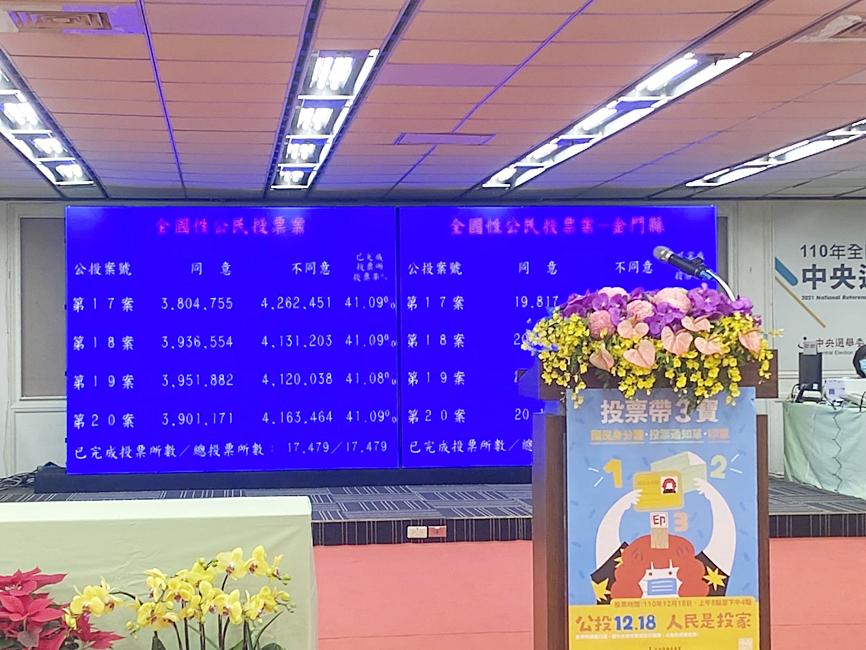Voters yesterday turned down a proposal to hold referendums alongside national elections, despite it receiving, by a small margin, the most “yes” votes of the four referendum questions.
The official result announced by the Central Election Commission (CEC) last night showed 49 percent in favor and 51 percent not in favor, or 3,951,882 million and 4,120,038 million votes respectively.
The question, proposed by the Chinese Nationalist Party (KMT), read: “Do you agree that referendums should be held alongside general elections if a referendum proposal is confirmed less than six months before a general election?”

Photo: Wu Shu-wei, Taipei Times
To pass, the number of “yes” votes needed to surpass the number of “no” votes, and total more than one-quarter of the electorate, or 4.96 million.
Neither threshold was reached, with only 19.93 percent of the total electorate voting in favor.
Opponents of the proposal pointed mainly to a chaotic process in 2018, when 10 referendums were voted on alongside the nine-in-one local elections.
They said the process puts a heavy burden on poll workers and caused confusion at polling locations, as votes were still being cast when counting began.
Opponents also cited voter fatigue caused by long lines and the number of items on the ballot, with some voters spending as long as half an hour in the voting booth to sort through the many, often confusing questions.
KMT supporters blamed administrative negligence for the messy polls rather than their timing, saying that the CEC had failed to address equipment and labor shortages.
They also questioned whether turnout for referendums would suffer if held separately, while rejecting the supposition that people would disregard the election to focus on referendums.
Until yesterday, all referendums were held on the same day as elections.
Another primary argument in favor of the proposal was financial, as the KMT said that holding referendums alongside elections would save taxpayers’ money, although opponents said that more items on the ballot would always require more money, as more poll workers and equipment would be needed.
The KMT also criticized the Democratic Progressive Party (DPP) for changing its stance on the issue, as it had previously supported the proposal.
The DPP said it had been forced to advocate holding the two votes at the same time to overcome the extremely high thresholds put on referendums by the KMT.
The DDP said it had changed its stance as the barriers have been lowered, and after seeing the issues that arose in 2018.
Since the referendum did not pass, no similar questions are allowed to be proposed within the next two years.

The Ministry of Foreign Affairs (MOFA) yesterday voiced dissatisfaction with the Comprehensive and Progressive Agreement for Trans- Pacific Partnership (CPTPP), whose latest meeting, concluded earlier the same day, appeared not to address the country’s application. In a statement, MOFA said the CPTPP commission had "once again failed to fairly process Taiwan’s application," attributing the inaction to the bloc’s "succumbing to political pressure," without elaborating. Taiwan submitted its CPTPP application under the name "Separate Customs Territory of Taiwan, Penghu, Kinmen and Matsu" on Sept. 22, 2021 -- less than a week after China

THE GOOD WORD: More than 100 colleges on both sides of the Pacific will work together to bring students to Taiwan so they can learn Mandarin where it is spoken A total of 102 universities from Taiwan and the US are collaborating in a push to promote Taiwan as the first-choice place to learn Mandarin, with seven Mandarin learning centers stood up in the US to train and support teachers, the Foundation for International Cooperation in Higher Education of Taiwan (FICHET) said. At the annual convention of the American Council on the Teaching of Foreign Languages held over the weekend in New Orleans, Louisiana, a Taiwan Pavilion was jointly run by 17 representative teams from the FICHET, the Overseas Community Affairs Council, the Steering Committee for the Test of Proficiency-Huayu, the

A home-style restaurant opened by a Taiwanese woman in Quezon City in Metro Manila has been featured in the first-ever Michelin Guide honoring exceptional restaurants in the Philippines. The restaurant, Fong Wei Wu (豐味屋), was one of 74 eateries to receive a “Michelin Selected” honor in the guide, while one restaurant received two Michelin stars, eight received one star and 25 were awarded a “Bib Gourmand.” The guide, which was limited to restaurants in Metro Manila and Cebu, was published on Oct. 30. In an interview, Feng Wei Wu’s owner and chef, Linda, said that as a restaurateur in her 60s, receiving an

Kaohsiung Mayor Chen Chi-mai (陳其邁) on Monday announced light shows and themed traffic lights to welcome fans of South Korean pop group Twice to the port city. The group is to play Kaohsiung on Saturday as part of its “This Is For” world tour. It would be the group’s first performance in Taiwan since its debut 10 years ago. The all-female group consists of five South Koreans, three Japanese and Tainan’s Chou Tzu-yu (周子瑜), the first Taiwan-born and raised member of a South Korean girl group. To promote the group’s arrival, the city has been holding a series of events, including a pop-up